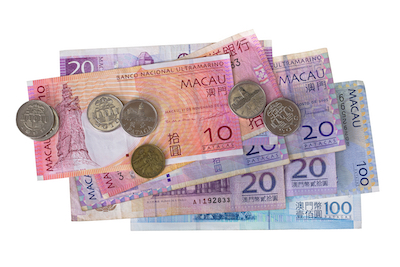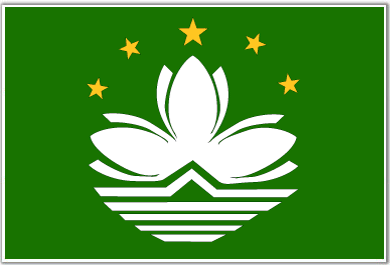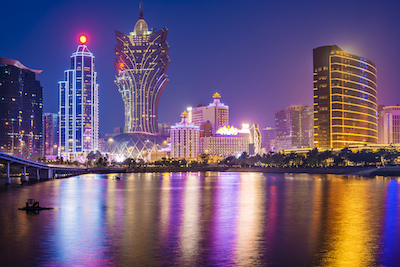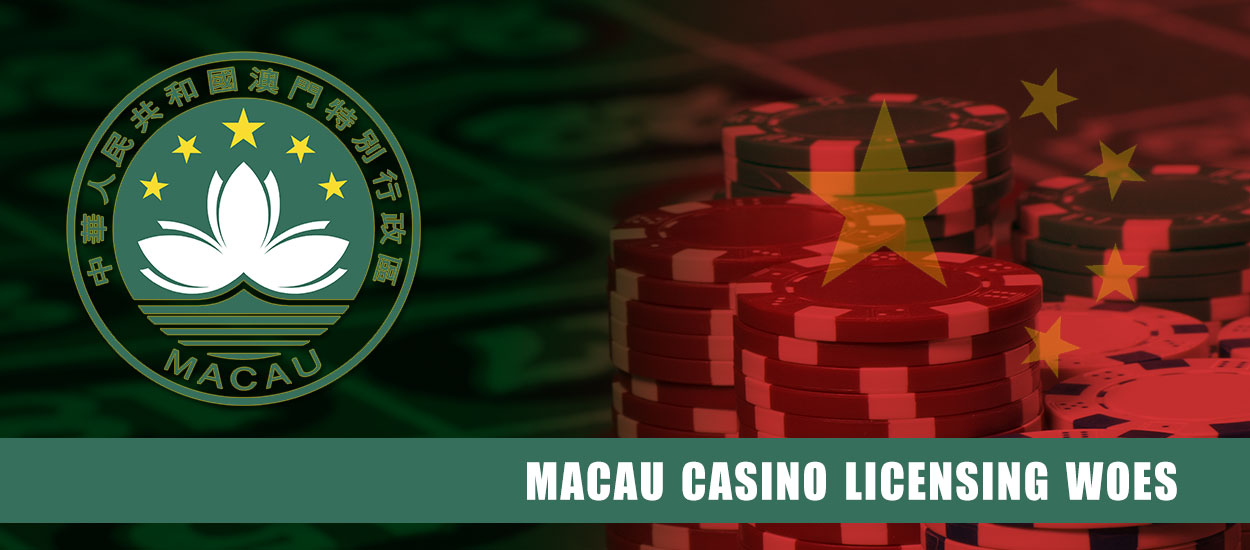Macau casino licenses are up for renewal in 2022 and some companies are worried
Macau casinos have been struggling mightily ever since the pandemic hit in 2020. Macau closed its casino doors for 15 days in February 2020 due to COVID-19 and has failed to regain anything close to the same traffic since. Restrictions placed on gamblers that required quarantining, testing, and masking, along with clamp downs on flights and ferries from China, led to most Chinese and Hong Kong gamblers deciding to stay home and wait for better times. In 2019, Macau had gross gaming revenues of around 293 billion Macanese Pataca (MOP) which equates to about $3.6 billion USD, but in 2020 revenues dropped to just 61 billion MOP or about $759 million dollars. And while revenues have rebounded slightly in 2021 after some restrictions were lifted, they are still way off the 2019 figures and September saw the lowest revenue for that month to date. Reports state that revenues in the first 10 months have only been about 75 billion MOP compared to 247 billion MOP in 2019 for the same period. It is expected that the revenue in December will likely plummet to almost nothing as new measures have been instituted in light of the Omicron variant that once again requires visitors to quarantine for 14 days upon arrival in Macau. In addition, new social distancing measures and other restrictions have been renewed.
In 2019, Macau had gross gaming revenues of around 293 billion Macanese Pataca (MOP) which equates to about $3.6 billion USD, but in 2020 revenues dropped to just 61 billion MOP or about $759 million dollars. And while revenues have rebounded slightly in 2021 after some restrictions were lifted, they are still way off the 2019 figures and September saw the lowest revenue for that month to date. Reports state that revenues in the first 10 months have only been about 75 billion MOP compared to 247 billion MOP in 2019 for the same period. It is expected that the revenue in December will likely plummet to almost nothing as new measures have been instituted in light of the Omicron variant that once again requires visitors to quarantine for 14 days upon arrival in Macau. In addition, new social distancing measures and other restrictions have been renewed.
Gaming stocks plummet
Not surprisingly, casino stock prices of companies located in Macau have plummeted because of low revenue, but there is a far different reason why casino stocks saw an $18 billion drop in value in September, and it has nothing to do with revenues.
Macau casino licenses handed out for 20 years in 2002 are set to expire in June 2022 and Macau officials have announced that they will not simply be renewed. The government said that it would be looking at ways of avoiding unhealthy competition, which many operators fear could include revoking some licenses and putting in other measures which would reduce profitability and make operating in Macau uncomfortable. To understand why the new license announcement is such a big concern and why the Sands and MGM are particularly worried about the new regulations, one needs to understand the history of casino gambling in Macau.
History of casinos in Macau
Macau was a colony under Portuguese rule for almost 600 years, but an agreement between Portugal and China was reached in the 1980s to give sovereignty of the colony to China in 1999. This became almost inevitable when the UK returned Hong Kong to China in 1997 after the 99-year lease of that colony in 1898 expired and Portugal seemed uninterested in being the lone wolf in the area. When China took over, they decided to treat Macau and Hong Kong differently than mainland China. Instead of simply incorporating them into the country, China decided to designate each a Special Administrative Region (SAR) of the People’s Republic of China in an experiment China called the "one country, two system" solution. That system allowed the SARs to possess separate legislatures, legal systems, police forces, education systems and immigration policies while the national Chinese government was responsible for diplomatic issues, military, and state level affairs. At the same time, China made it clear to the SARs that the concessions were not absolute, and the SARs were not completely autonomous, so if the national government felt the need to step in to enforce laws or policies they deem necessary in Macau or Hong Kong, then they had the right to do so. (The Hong Kong protests and uprisings in 2019-2020 was spurred by China demanding that fugitives and criminals in Hong Kong be extradited and tried by Beijing). Gambling in all of mainland China is illegal and is punishable with harsh fines or jail time and horse racing is legal in Hong Kong, provided it is offered by the Hong Kong Jockey Club. Gambling is legal in Macau under a law which permitted gambling that Portugal hoped would make the colony more self-sufficient. In 1962 Portugal gave a gambling monopoly to Sociedade de Turismo e Diversões de Macau (STDM), a company that was headed by Stanley Ho, who eventually became one of the richest men in the world as a result of business dealings in Macau and Hong Kong. The license was renewed in 20-year increments until 2002 when the Macau government, now a SAR, in collaboration with the Chinese government, demanded the monopoly system be ended. Macau held bids for three new licenses, and these were won by SJM Holdings (a subsidiary of STDM), Galaxy Entertainment, (a Hong Kong based hospitality and tourism company), and Wynn Resorts, (an American company owned by Steve Wynn and operating out of Nevada). There was a lot of anger among the losing companies who said the process was rigged. So, in June 2002, Macau decided to allow each winning company to have a subconcession relationship, whereby each winning bidder would work with the other company to offer games and build casinos under their winning bid in an effort to ease the cost of building the casinos by themselves and to end any legal challenges by the losing bidders. Las Vegas Sands which is called Sands China in Macau, was the subconcession for Galaxy Entertainment, MGM, which is called MGM Macau in the SAR, was the sub-licensee for SJM and Melco International Development Limited, a Hong Kong development and tourism company became the subconcession for Wynn Resorts.
Gambling in all of mainland China is illegal and is punishable with harsh fines or jail time and horse racing is legal in Hong Kong, provided it is offered by the Hong Kong Jockey Club. Gambling is legal in Macau under a law which permitted gambling that Portugal hoped would make the colony more self-sufficient. In 1962 Portugal gave a gambling monopoly to Sociedade de Turismo e Diversões de Macau (STDM), a company that was headed by Stanley Ho, who eventually became one of the richest men in the world as a result of business dealings in Macau and Hong Kong. The license was renewed in 20-year increments until 2002 when the Macau government, now a SAR, in collaboration with the Chinese government, demanded the monopoly system be ended. Macau held bids for three new licenses, and these were won by SJM Holdings (a subsidiary of STDM), Galaxy Entertainment, (a Hong Kong based hospitality and tourism company), and Wynn Resorts, (an American company owned by Steve Wynn and operating out of Nevada). There was a lot of anger among the losing companies who said the process was rigged. So, in June 2002, Macau decided to allow each winning company to have a subconcession relationship, whereby each winning bidder would work with the other company to offer games and build casinos under their winning bid in an effort to ease the cost of building the casinos by themselves and to end any legal challenges by the losing bidders. Las Vegas Sands which is called Sands China in Macau, was the subconcession for Galaxy Entertainment, MGM, which is called MGM Macau in the SAR, was the sub-licensee for SJM and Melco International Development Limited, a Hong Kong development and tourism company became the subconcession for Wynn Resorts.
The new setup seemed ideal, but almost from the beginning the Chinese government was concerned about the impact of gambling on Chinese nationals. Consequently, the country limited visits to Macau by Chinese residents. Originally residents could go to Macau twice a month, but it was soon reduced to once a month and now is down to once every two months. Naturally non-Chinese residents are not restricted. China was also worried about the continued growth of casinos in the SAR, which expanded from 11 in 2002 to 31 in 2008 and some in the government told the Macau representatives that they felt the casino industry was becoming overdeveloped. To make matters worse, a major corruption scandal occurred in 2006 when Ao Man Long, the first Secretary for Transport and Public Works for Macau, was arrested and found guilty of taking bribes, abuse of power and money laundering and given a 27 year sentence after the Macau Commission Against Corruption determined that he gave preference for government work projects, including casinos, in exchange for money, much of which he pocketed. This had many in the Chinese government saying that they were right for deeming gambling as a bad influence and were also left wondering what other corruption might be taking place in Macau.  The Chinese and Macau governments also started looking into the actions of junket operators and triads (organized crime groups) who worked with casinos to bring in high rollers from Hong Kong and mainland China in exchange for a cut of the customer’s losses. Junket operators search for high rollers, arrange transfer of funds so that gamblers can play on credit rather than having to carry large sums of cash and the casinos have the money up front, and they find ways around Chinese control measures such as the limit on how often Chinese nationals can visit Macau. While this may seem unethical, most casinos just accept it as a cost of doing business in the SAR. As part of the high roller perks, junkets were also known to work with triads to provide the gamblers with drugs and hookers, and some of the triads have been implicated in running prostitution rings. There has even been talk that many of the prostitutes (which isn’t illegal in Macau), may be a part of a larger human trafficking ring organized by the triads. Moreover, there has also been concerns that some Chinese government officials are involved in corruption and look the other way when illegal activities are noted, in exchange for a kickback.
The Chinese and Macau governments also started looking into the actions of junket operators and triads (organized crime groups) who worked with casinos to bring in high rollers from Hong Kong and mainland China in exchange for a cut of the customer’s losses. Junket operators search for high rollers, arrange transfer of funds so that gamblers can play on credit rather than having to carry large sums of cash and the casinos have the money up front, and they find ways around Chinese control measures such as the limit on how often Chinese nationals can visit Macau. While this may seem unethical, most casinos just accept it as a cost of doing business in the SAR. As part of the high roller perks, junkets were also known to work with triads to provide the gamblers with drugs and hookers, and some of the triads have been implicated in running prostitution rings. There has even been talk that many of the prostitutes (which isn’t illegal in Macau), may be a part of a larger human trafficking ring organized by the triads. Moreover, there has also been concerns that some Chinese government officials are involved in corruption and look the other way when illegal activities are noted, in exchange for a kickback.
This revelation became front and center when Steven Jacobs, the CEO of Sands China, sued Las Vegas Sands for wrongful dismissal after he alleged that he was fired because he was looking into excessive payments to Macau lawyer Leonel Alves. Jacobs said Alves was only brought on by the company to exert pressure and give bribes to important Chinese legislators and to smooth over situations where Sheldon Adelson irritated Chinese government officials with his brusque actions. Jacobs also planned to cut out the junket operators which he deemed were corrupt, unnecessary and who took way too much of the profits. But Adelson claimed doing so would be financial suicide, since junkets accounted for 50-60 percent of the casino revenues. Adelson acknowledged that while he didn’t like it, junkets and bribes were just a part of doing business in Macau.
Things came to a boil in 2008 and really caught China’s attention when the Global Financial Crisis resulted in slow times for Macau casinos, who decided the best way to survive the crisis was to cut salaries or lay off staff. Many of the workers couldn’t survive without their salaries so they turned to the government for financial assistance. When the Chinese government looked into it, they discovered that not only were most workers treated poorly with no rights or job security, but that a large percentage of the jobs were given to foreigners from places like The Philippines and Thailand. The jobs were given to employees who were willing to work for less money than their Macau or Chinese counterparts, something that the Chinese government called inexcusable.
License expiration and renewal
So, as licenses are set to expire in 2022, the hope by most casino operators was that the number of licenses would increase, or at worst, stay as is. MGM, LVSC and Melco also expected that their sublicenses would end and they would be given their own full license. In addition, there was the expectation that new casinos would be allowed to open to increase tax revenues.
But in September of this year, Lei Wai Nong, the Secretary for Economy and Finance in Macau said that an increase in licenses could lead to "an unhealthy competitiveness". He also indicated that the sublicenses would be abandoned. Not surprisingly this led all the licensees to start worrying about their future, especially MGM and LVSC, who as a sublicense could simply be told to leave Macau or that any new license for them will be for only a short period of time, allowing the Chinese and Macau governments to examine all the options up to and including ending licenses for the American companies. After all, a sublicense has far less rights and standing than a full licensee.
It is assumed that SJM will continue to operate as usual and that both Galaxy and Melco will be allowed to operate in Macau under the new provisions since they are local companies. There is also a belief that Wynn will have their license renewed since they were awarded a full license in the first place and Wynn has not been as outspoken as Sands China or MGM Macau about government corruption in Macau. One of the bright spots for MGM and Melco are that they have Stanley Ho’s family in charge of operations and the family still has a lot of influence. Daughter Pansy Ho is the CEO and partial shareholder of MGM Macau and son Lawrence Ho is the CEO and part owner of City of Dreams (a Melco casino in Macau). Sands China is headed up by Robert Goldstein, which some claim could be a problem come renegotiation time, given the nationalistic demands of the Chinese government. The consulting process between the casinos, the Chinese government and the Macau government was to end at the end of October, although no updates on decisions from the consultations have been revealed.
The other announcements by Lei in September were that employee protection measures would be put in place, likely meaning better salaries and benefits and preference given to hiring locals over foreign workers; strengthened verification measures for junket operators, an announcement which has led to many junket operators simply announcing they will no longer deal with Macau casinos; social responsibility measures, including requiring the hiring of people with disabilities and contributions by casinos to charities, education and science and culture; expansion of non-gaming elements such as convention space, entertainment complexes, infrastructure and parks; expanding and clarifying administrative penalties for criminal behavior; and introducing Chinese government representatives to monitor the day to day operations of the casinos. This last announcement is likely the most troubling to most of the casino operators since it is clear that China will use this oversight to highlight any violations of the rules, real or perceived, to increase fines and possibly expel license holders.
China has already indicated that they deem all gambling as a social blemish, and they are only allowing the concession to Macau to continue offering gambling to keep the SAR viable and to ensure that gamblers have an option other than illegal websites or visits to nearby countries. They also don’t want to upset the whole apple cart at once. In fact, China is so opposed to gambling that they handed out $900,000 to residents of China who were involved in online and cross border gambling which the country has deemed illegal gambling. And China has named a blacklist system of countries where Chinese residents can’t gamble, under threat of fines or jail time. Currently this includes the Philippines, Vietnam, and Australia. It is expected that China will extend that list to include Japan, Korea and other Asian countries that may be luring Chinese customers. And China has a particular eye on junket operators who are now shifting their efforts from Macau to other Asian markets. There are even suggestions that if caught, junket operators can face the death penalty for taking Chinese residents to the blacklisted destinations.
So, it’s not surprising that Macau casino operators are concerned. When Stanley Ho had a monopoly, Macau was deemed a huge success and almost everyone was in awe of the billionaire and the way he made a poor Portuguese enclave a prosperous and viable tourist destination. And when the new casino licenses were handed out in 2002, casino operators were elated, as it appeared that China, by designating Macau an SAR, was finally accepting that gambling was a way of life and an opportunity to make everyone prosperous. But the new license regulations, which are set to take place next year, have made it clear that China still deems gambling as evil and the ultimate plan of the Chinese government is to wipe gambling from its landscape, which almost certainly will include Macau. While Macau contributes a lot of tax revenue, it is a pittance in comparison to the whole GDP of China and the Chinese government may deem the land in Macau more valuable than the tax revenue. So, the only question is how long this will take and whether U.S. companies will be the first to be shown the door. Most of the smart money at this point has to be that the end will come soon and that the U.S. casino companies in Macau are in trouble, particularly the Sands.
Read insights from Hartley Henderson every week here at OSGA and check out Hartley's RUMOR MILL!








































